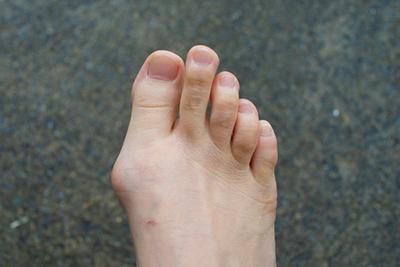
Bunions often cause extensive pain and discomfort that can worsen over time. Since bunions protrude from the side of the foot, they can easily become inflamed and irritated as the interior of the shoes rub against them throughout the day. Fortunately, various treatment options are available. Dr. Mark Light, the board-certified podiatrist at East Cobb Foot & Ankle Care in Marietta, GA, treats bunions and can help you find relief from the pain and discomfort.
Causes of Bunions
A bunion is a bony bump at the base of the big toe that sticks out along the side of the foot. A bunion can form when the big toe slants toward the smaller ones, often due to a dislocated joint. When the big toe slants toward the other toes, the bony end of the toe joint slants in the opposite direction and presses against the side of the foot so that a bony bump forms. Some factors that can lead to a dislocated toe joint and the development of bunions include:
- Foot or toe injuries
- Faulty foot structure (e.g. flat feet)
- Wearing shoes that are extremely tight or narrow
- Being on the feet for extended periods
- Neuromuscular problems
- Certain types of arthritis
Treatment Options for Bunions
A bunion is a bone deformity that will not heal on its own. Treatment is needed to correct the problem and alleviate the discomfort. Without treatment, bunions can become increasingly more inflamed, irritated, and painful. Other problems can also develop, such as bursitis, hammertoes, arthritis, and thickening of the skin on the bottom of the foot.
The experienced podiatrist at our foot and ankle practice in Marietta, GA, treats bunions utilizing a variety of methods and can develop a treatment plan tailored to your specific needs. Treatment options for bunions include:
- Bunion removal surgery
- Removal of calluses or corns on the feet
- Surgery to correct a bone deformity or dislocated joint
- Foot exercises to prevent joint stiffness and improve mobility
- Protective padding or cushioning in the shoes to minimize friction
- Custom orthotics to stabilize the toe joint and correct foot positioning
- Wearing shoes with sufficient room to accommodate the bunions
- Night splints are worn while sleeping to help realign the toe joint
Bunion Surgery and Post-Operative Care
Bunion surgery might be recommended if you are dealing with severe foot pain that limits your ability to wear shoes or walk, there is chronic inflammation and swelling of the big toe, or you have a bone deformity with stiffness in the big toe. If you do have surgery, you will need to stay off the affected foot for up to two weeks afterward. The doctor will provide specific post-operative care instructions that could include:
- Using a walker, cane, or crutches
- Wearing a walking cast or boot
- Avoid putting weight on the big toe
- Elevate the foot to reduce swelling
- Take pain medication as directed
- Keep the surgery site dry
Contact Us Today
If you are dealing with bunions, we can help. Schedule a consultation with Dr. Light to learn more about the different options for treating your bunions by calling East Cobb Foot & Ankle Care in Marietta, GA, at (770) 977-8221.
